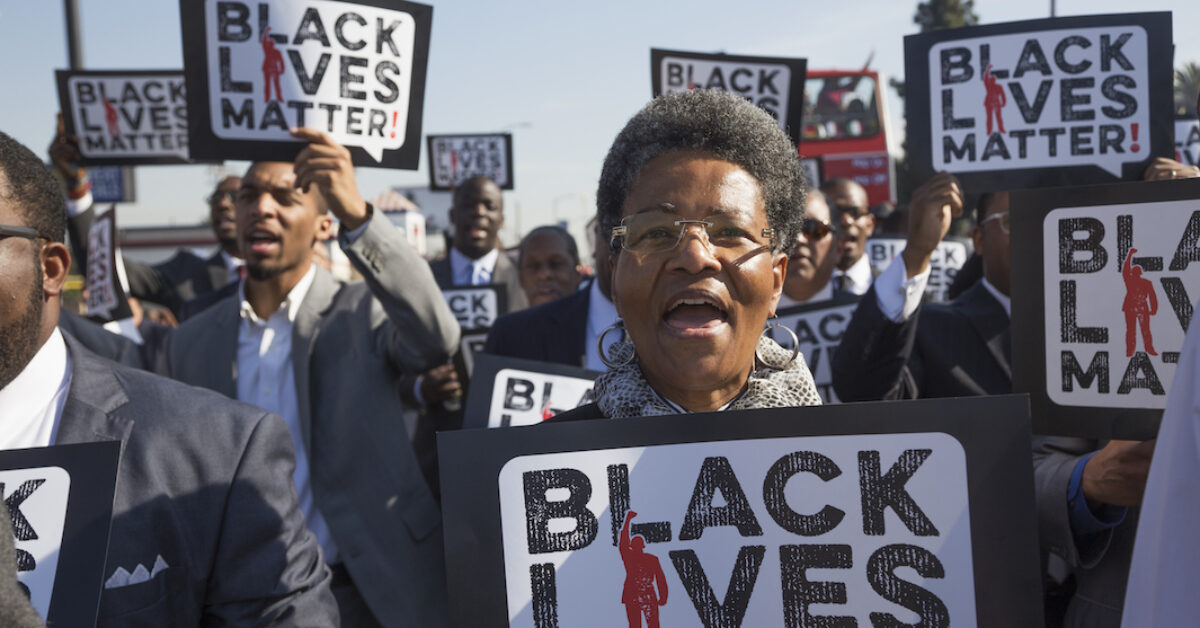When the unbearable video of George Floyd’s death surfaced on social networks on Tuesday, May 26, Alice Endamne, a Gabon-born children’s book author married to an African-American, said, “It begins again.” Alice Endamne has been living for 22 years in California, where she came to do research on racial and sexist discrimination, and has long been aware of the “institutionalized” racism that is rife in the United States, particularly among the police force. “This will happen again until attitudes change,” she says. “My husband is a nuclear physicist. When he walks to the store, I’m always afraid for him!”
The Promise of Obama
Among black French and French-speaking Americans, she is not alone in feeling this way. At her home north of Atlanta, Chrystelle Kimoto had a conversation with her 12-and-a-half-year-old daughter after the release of the video showing a white police officer kneeling on George Floyd’s neck. “She asked me, ‘Mom, can this happen to us? I told her it could, unfortunately.” When she arrived nine years ago, Chrystelle Kimoto was seduced by the promise of the Obama presidency. Suffocated by everyday racism in France, she moved with her husband and children to the United States after winning the green card lottery.
In 2012, racism caught up with her. Trayvon Martin, a 17-year-old black boy, was shot by a volunteer security guard in Florida without legal consequences. One night, her son came back from basketball in a hoodie like the one Trayvon Martin wore the day he died. “I told him he couldn’t do that. These deaths are so frequent. It’s complicated for the parents. We’re killing the innocence of our children,” she says. Her boy will reach the legal driving age (16) at the end of October, but she fears that when he gets behind the wheel he will risk being stopped by the police.
As a black Frenchwoman in the United States, Chrystelle Kimoto sometimes feels caught in the middle of dynamics that are difficult to reconcile. In the eyes of white people, who are numerous in the French community and in her neighbourhood, she is black. But that doesn’t mean she identifies with the challenges of the African-American community. As an immigrant, she says she sees the United States as a land of opportunity, where African-Americans still suffer from many of the socioeconomic ills inherited from slavery, despite the progress of the 1960s. “Relationships with black Americans can sometimes be complex because, as descendants of slaves, some people feel that black Europeans or Africans do not experience the same things they do, and do not understand. I’m black, I’m French, and I’ve lived through racism, but it will never be the same as what they’re experiencing,” she says. “For my part, I have the privilege of arousing curiosity. Of course I am black, but when I open my mouth, people hear my French accent and ask me where I come from, whereas a black American might be subject to more prejudice.”
When we speak to him on the phone on Sunday evening, Claude Grunitzky is putting the finishing touches on an article for a site he founded, True Africa. It’s an article about the outrage and national crisis that has gripped the country since the death of George Floyd. But it is above all an article about his personal experience, that of a black man who lives in the United States but was not born and raised there. Born in Togo, having grown up in France where he studied at Sciences Po, the journalist-entrepreneur arrived in the United States 22 years ago and was successful there, creating the magazine Trace, and then its eponymous media group, which has since been sold.
“When I left France for London and then New York, it was mainly because I was leaving a country where I’d never seen a black man reach the top, whereas in the U.S. there was Bill Cosby, Oprah Winfrey, and above all the whole hip-hop movement.” This idea of America as a land of opportunity has not disappeared, he says: “I’ve clearly taken advantage of these opportunities,” but it coexists with “institutionalized racism which is not of the same nature as the kind you might experience in France.”
“I remember,” he says, “having dinner in Paris with Opal Tometi, one of the co-founders of the Black Lives Matter movement a few years ago. It was a very complicated discussion. Basically, she explained to me that I couldn’t understand the African-American experience completely because I hadn’t experienced oppression growing up here.” Offended at the time at being excluded from the African-American experience, he says he thinks back these days to that conversation and realizes, “she was right: I will never know what it means to grow up black in the United States.” While he has “of course” experienced incidents “clearly motivated by racism,” he believes he has been far less of a victim of everyday racism than his American friends. “When I arrived, I was identified as French before I was seen as black, my personal cross-cultural and cosmopolitan history clearly gave me more opportunities than people born here who are prisoners of the system.”
Trump and the Lost Hope
In 2008, Claude Grunitzky experienced the election of Barack Obama as the dawn of a new era. This sense of hope was such that the event convinced him to become an American citizen. “And there really was a state of grace, which I myself took advantage of. But economic injustice is greater than ever, and that’s what fuels the anger today.” Above all, he says, the difference is that Donald Trump has replaced Barack Obama in the White House. In 2014, during Ferguson’s protests, after the death of Michael Brown, a black teenager killed by a white policeman, there was a willingness for dialogue among government leaders. “Today, with Trump and the kind of discourse he’s been creating since the beginning,” says Claude Grunitzky, “there’s no willingness to compromise, in fact it’s the opposite. This explains why the riots spread very quickly throughout the country, whereas in 2014 they were limited to a few cities.” This is the result, says the journalist, of Donald Trump’s provocations, but also of “the injustice of the social contract we have in the COVID-19 crisis—even in the statistics, as in New Orleans: 30% of the population is black, but blacks represent 70% of fatalities!”
BNA, a musician and model living in Brooklyn, arrived in New York City last year. A victim of racism in France, the Franco-Congolese woman has had disputes with white police officers in the United States. But she also feels separated from what African-Americans are going through around her. “As a black French woman, I was opposed to the way they responded to attacks. Then, when I understood their history, I could measure the trauma left by the legacy of slavery, prison, family problems,” she says. “They went through things that we didn’t go through. As French people, we have certain privileges.”
Even though she has experienced racism from the police in New York, BNA feels happier in the United States than in France, where she felt “demeaned.” Drawing on her multicultural background, the artist has just released a single, “Konnichiwa,” about tolerance, and is working on another song, “Congo,” about political instability in the African country, her other homeland. “In the U.S., racists are more outright about it. In France, they’re more hypocritical.”






